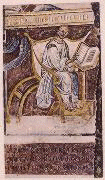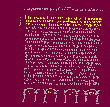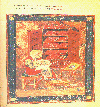 Augustine
AugustineThis is a home page for miscellaneous materials relating to the culture of the Mediterranean world in late antiquity (roughly 200-700 C.E.). Some of it is organized for the benefit of instruction and there will be from time to time links of interest principally to my students, but there are also substantial materials of general interest. This page prepared and maintained by James J. O'Donnell (jod@georgetown.edu.)
The syllabus for my Winter Quarter 1995 course (taught Jan-Mar 1995 while I was a visiting faculty member at the University of Washington) is the most recent version of that document. There is also a guide to reading (and finding a paper topic in) Augustine's Confessions. The older list of topics for papers on Boethius' Consolation of Philosophy due on 22 February is still available.
Of greater general interest is the supplementary list of readings for students in this field; suggested additions always welcome. From the net, a bibliography specifically devoted to recent work on late roman military affairs comes from Hugh Elton of Trinity College (Hartford). Ralph Mathisen of the University of South Carolina now edits the on-line Late Antique Newsletter, which gives an excellent synopsis of current conferences and publications in the field. Finally, Prof. S. Muhlberger maintains Late Antiquity in the Mediterranean: A Guide to Online Resources.
 Augustine
Augustine Boethius
Boethius __The Christian Bible
__The Christian Bible __Cassiodorus
__Cassiodorus __The Christian
Topography of Cosmas Indicopleustes
__The Christian
Topography of Cosmas Indicopleustes __Jerome
__JeromeNicene and Post-Nicene Fathers: an old set of English translations of early Church fathers, including some very hard-to-find stuff, now on the net from Wheaton College.
Map of the Roman Empire: old but serviceable. Keep clicking on the part you're interested in for more detail.
Images from the 6th Century, by Steve Muhlberger (Nipissing University)
A recent conference on Shifting Frontiers in Late Antiquity is of great interest.
Claudian's Panegyric in Honor of the Sixth Consulship of the Emperor Honorius Augustus is available in Latin.
Latin text of the c. 500 Decretum de libris recipiendis sive non recipiendis.
ADDITIONAL READINGS
Pliny and Trajan on Christianity: from the years 111-113, Pliny the Younger's puzzled encounter with Christianity and Trajan's cautious but canny response.
Martin of Braga, complete works in Latin, thanks to Angus Graham.
Macrobius' Saturnalia, thanks to Bill Thayer of the University of Kansas.
What are barbarians for?
Life among the Huns: In the year 448, a gentleman and scholar from Thrace named Priscus accompanied Constantinople's ambassador, an officer named Maximinus, on a trek up north of the Danube to the court of Attila, king of the Huns. Priscus' account of his visit to Attila's court is one of the liveliest and most informative documents of the encounter between "Rome" and the "barbarian" from the whole late antique period.
Cassiodorus (born c. 490, died c. 585) was by turns statesman, theologian, and monk.
Edward Gibbon's Decline and Fall of the Roman Empire is deservedly a classic. Though deeply flawed in both learning and argument by modern standards, it remains a powerful influence on the way we have shaped our thoughts about the late antique past. We have here his General Observations on the Fall of the Empire in the West, that follow chapter 38 in his history (but may have been written before ever he began the whole work). See also excerpts from the first twenty chapters.
A particular theme of my work has been the relation of "pagans" and Christians: see my "Demise of Paganism". See now also Daniel Ridings, "Clement of Alexandria and the Intended Audience of the Stromateis, a paper delivered at the 1995 Oxford Patristic Congress.
The Rule of Benedict is available in Latin, English, and Hungarian.
Egeria in Jerusalem: Thanks to the work of Michael Fraser of the University of Durham, we have this excerpt, in Latin and in English of that portion of the itinerarium Egeriae in which that fourth century lady traveler (Spanish? Gaulish?) writes to her sisters in religion back home and describes the liturgy of the church at Jerusalem. Additional material is available at the site's home page.
In English, the "Confession" of Patrick, the apostle of Ireland.
In both English and Latin, Adamnan's Life of Columba from the St. Columba Home Page.
Prudentius' Peristephanon is an exotic and fascinating series of poems about martyrs, from c. 400 A.D. See also the Latin text of his Psychomachia.
A large and growing collection of primary texts in music and music theory from late antiquity through the middle ages is supplied by Thomas J. Mathiesen's Thesaurus Musicarum Latinarum project at Indiana University.
Oliver Phillips of the University of Kansas provides a Latin text of the Mosella of Ausonius.
Numerous Latin texts (some duplicating those found elsewhere on this server) are indexed in the Latin library of the Labyrinth.
Did Dante write the "Letter to Cangrande" that explains the meaning of the Divine Comedy? Robert Hollander's recent study in my Recentiores series insists that he did. Latin text also available.
The Enneads of Plotinus in the old standard English translation of Stephen McKenna have also been placed on the network by a hand unknown to me; it is a great service to make this challenging text so readily available.
I have no idea to whom to attribute this miscellaneous archive of patristic and early Christian texts, which includes English translations of various apostolic fathers, Tertullian, Cyprian, Augustine, early creeds, and the like; very useful for teaching purposes.
This page was first created for my Penn course in fall 1994 and the materials from that course remain available, but the syllabus and other materials for the current version of the course appear above.
Material here includes the syllabus for the course, fall 1994,as well as the week-by-week assigned readings for students in this course (fall 1994). On 26 October 1994, I added a syllabus update. Outlines of the lectures are posted after the lectures have been given. The mid-term examination based on Roger Collins's Early Medieval Europe 300-1000 is also here.
The final examination is a take-home, issued just before midnight on 12/8, and due back within fourteen days, i.e., by midnight at the end of the day on 12/22.